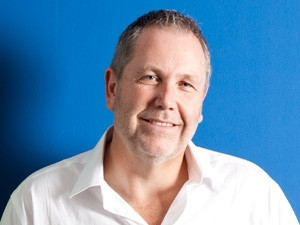
Stanley Edwards, director of Platypus Digital, is passionate about content. Having spent the last 26 years in content production, Edwards has watched the Internet increasingly shape the industry. From the trivialities of the Harlem Shake to the highly successful educational videos from Khan Academy, the potential for packaging and distributing this content is immense. This, plus Edwards' desire to address the education crisis currently facing SA, saw the creation of the OGLE Education Kiosk.
"We can't seem to get basic education content to learners through traditional methods such as delivering textbooks," notes Edwards. And why should learners sit without books while an abundance of educational resources remain freely available online?
"The educational content is out there but people don't have access to it due to lack of Internet connectivity and prohibitive data charges," he says. So how do you deliver this content to people? To Edwards, OGLE seemed the obvious answer. "The kiosk was developed out of a need to deliver content to people easily, cheaply and as effectively as possible," he says.
The driving force behind OGLE is an ambition to give people who don't have Internet connectivity access to educational content at no data or content cost. "It's about delivering free education content to our learners who so desperately need it."
How it works
The kiosk is essentially a digital content vending machine that gets placed in schools, explains Edwards. "Working off a simple touch-screen interface, any learner or teacher can go up to it, browse the screen, select education content and download it to any memory device."
Seeking to impact the widest range of learners possible, and understanding technology limitations, Edwards realised the key was mobile phones. "Mobile phones are prolific. Students in some of the poorest schools we visited have phones." The kiosks were developed with this in mind. "You can download via Bluetooth or WiFi. Most phones play audio, so audio podcasts and lessons can be uploaded directly onto a device."
Apart from using freely available online resources, OGLE is "working with a number of education suppliers, such as Mindset Learn and SABC Education, that give us curriculum-aligned content at no cost".
The content is then uploaded onto the kiosk's hard drives.
Social enterprise model
A major problem faced by educational social enterprises is how to have the largest impact on learners. "Donor-dependent projects can only scale depending on donor CSI funding, which usually means not making the impact they need to make," Edwards points out. "So we're trying to develop a social enterprise model around the kiosk."
Where are OGLE kiosks available for rollout?
"We're available to roll out anywhere in the country. We'll look at doing five at a time due to economies of scale. If we have a trainer doing orientation, we'd rather have them doing five allocations at a time, rather than one," says Stanley Edwards, director of Platypus Digital.
Estimated time to pay off a single OGLE Kiosk?
"Based on our models and having different kiosk services offered, from entertainment content to airtime sales, you could most probably pay off a kiosk within two to three years," says Edwards.
Having visited a number of schools where donated computer labs had fallen into disrepair due to lack of available funds, a key feature of OGLE entails creating a revenue-generation model. "It's important for us to fund the kiosks so that donors get their money back and the continuing generated revenue goes directly back to the school."
To that end, the kiosks sell premium content such as music, movies, airtime and electricity, thus creating sustainable funding. "This revenue funds the kiosk, which we share with the school. This allows us to scale and sustain the project," Edwards says.
"We launched the kiosks towards the end of last year and the response has been phenomenal," says Edwards, who presented the initiative to over 70 corporate clients. "We have a commitment for 15 installations and we should get another 10 in the next month or so."
Getting the kiosks to schools is only half the battle. With such projects, entrenching practice comes with educating the communities on how to effectively use the technology, something Edwards is aware of.
The kiosk developed out of a need to distribute content to people easily, cheaply and as effectively as possible.
"Part of the rollout cost is educating the schools when the kiosk gets put in." This process includes putting in place OGLE Heroes - members of the community who will be responsible for ensuring the kiosks remain functioning.
Edwards is determined to make it work. "It's growing slowly but we're getting there. Now it's really about making an impact."
It's about delivering free education content to our learners who so desperately need it.
First published in the June 2013 issue of ITWeb Brainstorm magazine.
* Article first published on brainstorm.itweb.co.za
Share